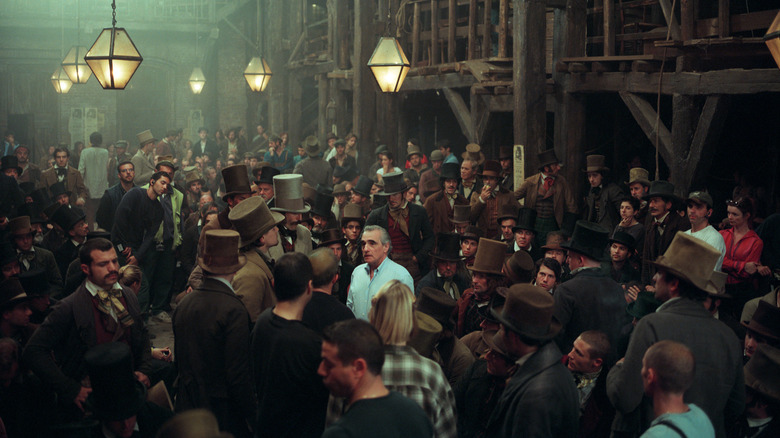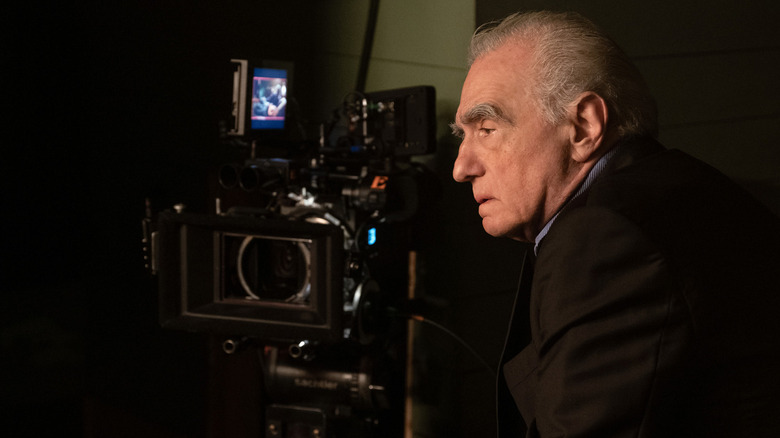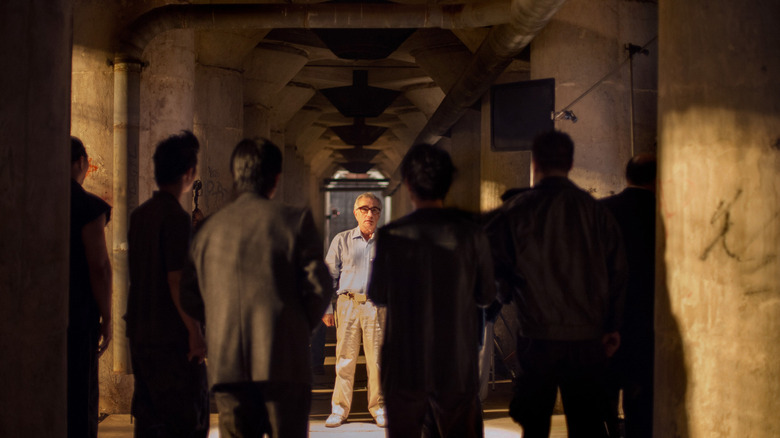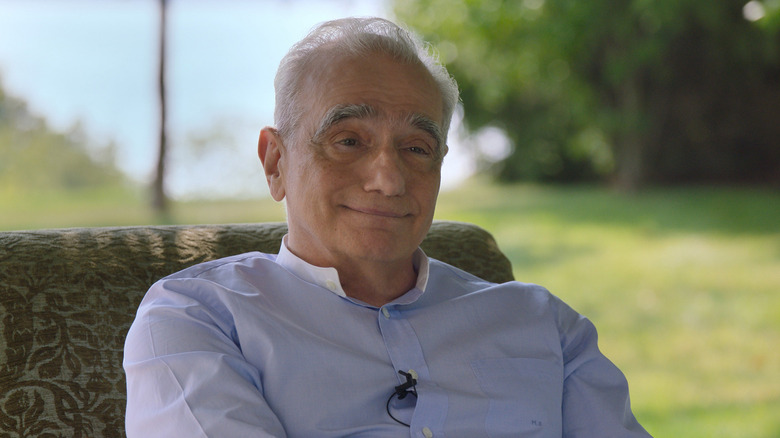Mr. Scorsese Review: A Loving Tribute To Our Greatest Living Filmmaker
We are lucky to have Martin Scorsese. While I'm sure opinions vary and there can be some healthy debate on the subject, in my humble opinion, Scorsese is our best living filmmaker. Hell, I might even want to take it a step further and suggest he's the greatest filmmaker of all time. Sound hyperbolic? I really don't care. A film obsessive often imitated and never duplicated, Scorsese may not be the most financially successful member of the New Hollywood era that reshaped American cinema, but the case can be made that he's the best.
Still going strong at 82 (his most recent feature, "Killers of the Flower Moon," is a full-blown masterpiece), Scorsese's life and career gets the docuseries treatment in the form of "Mr. Scorsese," an Apple TV+ series helmed by Rebecca Miller. The results are charming and insightful, although to be fair, if you're a Scorsese nerd like me, there's not a whole lot revealed here that you likely haven't heard before.
But even if you're well-versed in Marty lore, "Mr. Scorsese" hammers home the point that Scorsese is one of a kind, an immensely gifted filmmaker who understands movies (and their power) more than seemingly anyone else. The docuseries doesn't try to diagnose him, and I'm no medical expert, but the not-so-subtle implication that pops up time and time again here is that Scorsese might be clinically obsessive-compulsive about the art of making movies. The filmmaker is front and center throughout the docuseries, offering up frequently funny commentary on his long career and it's ups and downs. Many of his closest collaborators are on hand too, most notably longtime editor Thelma Schoonmaker and of course his two most frequent leading men, Robert De Niro and Leonardo DiCaprio (the way Miller introduces De Niro into the doc at the end of episode 1, complete with a Rolling Stones needle-drop, is so delightful that I found myself giddy). "Mr. Scorsese" may not be the most revealing of documentaries, but it does serve as a loving tribute to one of the best of the best.
Mr. Scorsese gives us the full Martin Scorsese origin story
A small, sickly kid born to Italian immigrants in a version of New York City that doesn't even exist anymore, Scorsese came to the movies through either fate or chance, take your pick. As "Mr. Scorsese" underscores, Scorsese has long suffered from asthma (we actually see him take a blast from his inhaler at one point during an interview). When he was a kid living in a tenement building, the summers were particularly brutal for young Marty — the heat made it hard to breathe and the Scorsese home didn't have air conditioning (most homes didn't in those days).
One place that did have air conditioning, however, was the movie theater. So when summers would roll in, Scorsese's father would take him to the movies to escape the heat and help his lungs. An obsession was born, as Scorsese became enraptured with the moving image. (During this reveal, Miller cuts to an interview with filmmaker Spike Lee, who hilariously sums things up by proclaiming, "Thank God for asthma!")
As Scorsese recounts his origin story, he also gives us a wonderful little detail about his childhood influence on his cinematic style. Since his asthma had him stuck inside a lot as a kid, he would spend hours gazing out the window of his family apartment down on the streets below. "That's why I like high-angle shots," Scorsese says, at which point Miller smartly cuts in a series of memorable high-angle shots from Scorsese's films. It's like a key opening a lock on a door, revealing a whole new world.
Mr. Scorsese walks us through the director's incredible filmography
"Mr. Scorsese" follows a pretty standard life-story format, tracking Scorsese's childhood, his NYU film school days, and his journey to Hollywood. Forever the outsider, Scorsese didn't quite fit in out in LA and would of course head back to New York. His career would start off small with a student film ("Who's That Knocking at My Door"), an editing (and some would argue co-directing) gig on the documentary "Woodstock," and work with the legendary B-movie producer Roger Corman ("Boxcar Bertha"). But some much-needed advice from independent film auteur John Cassavetes made Scorsese realize he shouldn't just be a filmmaker for hire — he should be making movies that actually meant something to him. And so he made "Mean Streets," the film that first teamed him with De Niro and set him on a path to become one of the greatest American moviemakers of all time.
From here, "Mr. Scorsese" speed-runs through the filmmaker's acclaimed career. The films that might be considered his major works get the most attention, while others are only briefly touched upon (for example, "After Hours," a film that has received some much-deserved reappraisal since it first opened in the '80s, feels a bit underserved here). Along the way, there are plenty of wonderful little anecdotes, such as how the cocaine use running rampant on the set of the quasi-musical "New York, New York" helped spell that film's doom. A considerable amount of time is also devoted to the religious backlash that arose around "The Last Temptation of Christ."
De Niro is characteristically reserved about their collaborations, but the doc truly underscores how important and vital their relationship was and is (De Niro bringing Scorsese "Raging Bull" is highlighted as a kind of life-saving moment, with the actor imploring the filmmaker to give the project a shot while Scorsese was laid-up in the hospital due to illness caused by drug addiction). The doc also hammers home the fact that Scorsese's teaming up with Leonardo DiCaprio essentially revitalized the great filmmakers career — after a string of box office flops had him on the ropes, working with a big star like DiCaprio enabled Scorsese to finally get his passion project "Gangs of New York" off the ground and began a partnership that would lead to some of Scorsese's biggest financial hits.
A celebration of Martin Scorsese
Again: If you're a Scorsese obsessive, you likely know most if not all of this already. But these are still fun stories to listen to, and the way the docuseries intercuts footage from Scorsese's films only enhances the experience. "Mr. Scorsese" is clearly more interested in the director's work than his personal life, although that's not to say it ignores biographical details. Scorsese's various marriages are touched upon, and all three of his daughters sit for interviews here (Francesca, Scorsese's youngest daughter, has become a celebrity in her own right in recent years thanks to her funny social media presence, but I want to give a nod to Domenica Cameron-Scorsese, who comes across here as a genuinely sweet and caring person; I wanted more moments with her).
Ultimately, your enjoyment of "Mr. Scorsese" will boil down to how much you enjoy Mr. Scorsese's work. I doubt anything here will suddenly convert one of his detractors, although Miller and the people she interviews do remind us again and again why Scorsese is such a big deal. But if you're a dyed-in-the-wool Scorsese-head (like me!), "Mr. Scorsese" is like catnip. It's fast, it's funny, it's even a little melancholy (how can it not be? Scorsese is in his 80s, and the day he leaves us will mark a tragic loss for cinema). But most of all, "Mr. Scorsese" is a celebration of our greatest living filmmaker and a confirmation that we are lucky to have experienced his art.
/Film Rating: 7 out of 10
"Mr. Scorsese" is streaming on Apple TV+ starting October 17, 2025.



